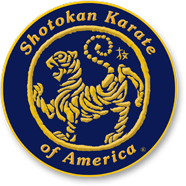The Chapel Hill Shotokan Dojo opened in April 1978 in the Hillel Foundation, with a single twelve-year judo student from South Africa. By autumn, Javier Narvarte and Mike Erisman formed a strong nucleus, eventually expanded by other members including Hugo Castillo (1979), and Nora and Oleg Favorov (1980). Ray Berry (Randolph-Macon College), administered the first kyu test in spring 1979, followed in that autumn by Carl Jacobson (Delaware). The Dojo continued to grow in spurts and starts throughout the years. However, it produced many fine black belts by the end of its first decade. At that particular time, Salah El Mestikawy (Paris) joined us for three years bringing a pragmatic approach to kumite; and shortly thereafter Kitty Gallagher continued inspired kumite practices gleaned from the realistic teachings of Tom White and Ray Berry. Demolition of the Hillel Foundation in 1999 shifted practices briefly to McDougle Elementary School, then to the Recreational Therapy gym at UNC Memorial Hospital (2000-2007), where Rob Clark fully established his leadership credentials. In 2007 the hospital gym was repurposed. After a period of practice at Millennium Fitness in Chatham County, we have since 2012 settled in our current home in the Lower School gym of Duke School, which, although located in Durham, is just a few miles north of Chapel Hill.
Over the years, former members spread out seeding new dojos: Scott Swartzwelder (Duke University, NC), Leslie S. Jones (Columbia, SC), Bill Taylor (Austin, TX), Keith Hasson (Atlanta, GA), and John Foster (Carrboro, NC). Or, assumed leadership of established dojos: George Washington University, DC (Kitty Gallagher) and Duke University (sequentially by Rob Clark, Keith Hasson, Al Sternberg, and Mary Prasad). In 2008 John Foster took over leadership of the Duke University dojo. A reciprocal association developed between Duke University and Chapel Hill enabling members to train in both dojos.
Black Belts
Members who attained the rank of shodan (1°) or advanced dan rankings in the Chapel Hill or Duke University Shotokan Dojo (†) or both (‡):
- Mike Ameen (1°, 2°)
- Ken Brumer (1°)‡
- Hugo Castillo (1°)
- Mina Choi (1°, 2°)
- Robert Clark (3°, 4°, 5°)
- Slim Colman (1°)
- Mike Erisman (1°)
- Nora Favorov (1°, 2°)
- Oleg Favorov (1°, 2°, 3°)
- John Foster (1°, 2°)
- Kitty Gallagher (3°, 4°)
- Martin Gonzalez (1°)
- Keith Hasson (1°)†
- Deborah Hsu (1°)‡
- David Huang (1°)‡
- Leslie S. Jones (1°)
- Hilmar Lapp (1°, 2°)‡
- Yehuda Lev (1°)
- Steve Loehr (1°)
- Daniel Logan (1°)
- Aaron Low (1°)
- Bill Low (3°)
- Collin Lynch (1°)
- Raven Manocchio (1°)
- Mirta Mihovilovic (1°, 2°)
- Andy Millager (1°)
- Javier Narvarte (1°)
- Jason Peck (1°, 2°)
- Al Pellom (1°)
- Mary Prasad (1°)
- Ravindra Prasad (3°)
- Danion Rapoza (1°)
- Shanon Schuster (1°)
- Tina Shepardson (1°)‡
- Aubrey Smoot (3°)
- Al Sternberg (1°, 2°, 3°)
- Sara Swartzwelder (1°, 2°)
- Scott Swartzwelder (1°)
- Bill Taylor (1°)‡
- Cory Tray (1°)†
- Shumin Wu (1°)‡
Former Chapel Hill or Duke University Dojo members who attained dan rankings elsewhere:
- Jeff Behar (1°)
- Josh Corbin (1°)
- Michael Erisman (2°)
- Kitty Gallagher (4°, 5°)
- Renate Gebauer (1°, 2°)
- Rich Pierce (1°)
- Ravindra Prasad (4°)
- Shumin Wu (2°)
History of Karate-Do
The history of karate-do can be traced back more than a thousand years and, along with the lineage of our teaching, is explained on the Shotokan Karate of America website.
